Key takeaways:
- Engaging in reparations politics requires deep reflection on historical injustices and the personal stories that underlie them, emphasizing the need for listening to affected voices.
- Effective outreach to lawmakers involves personal storytelling, staying engaged through follow-ups, and creating a connection that makes the issue relatable and urgent.
- Crafting messages with clarity, emotional authenticity, and aligning them with lawmakers’ existing beliefs can significantly influence their support for reparations.
- Combining personal narratives with compelling data during interactions enhances the impact of arguments, fostering deeper conversations with policymakers.

Understanding reparations politics
Reparations politics is a multifaceted issue that delves into historical injustices and their modern implications. For me, engaging in conversations around reparations forces me to reflect deeply on the generational trauma some communities have endured. Can you imagine what it feels like to carry the weight of history every day?
As I immersed myself in this topic, I often found myself thinking about the different perspectives people hold. Many argue that reparations could foster healing and justice, while others fear it may create further divides. This push and pull in the dialogue made me realize how crucial it is to listen to diverse voices, particularly those who have been profoundly affected by systemic oppression.
Every time I attend a seminar on reparations, I’m struck by the emotional intensity of the discussions. One speaker shared their family’s story of loss and struggle, which brought tears to my eyes. This personal touch reinforces that reparations are not just political; they are deeply personal too. How can we talk about justice and equity without addressing the real-life impacts on individuals and families?
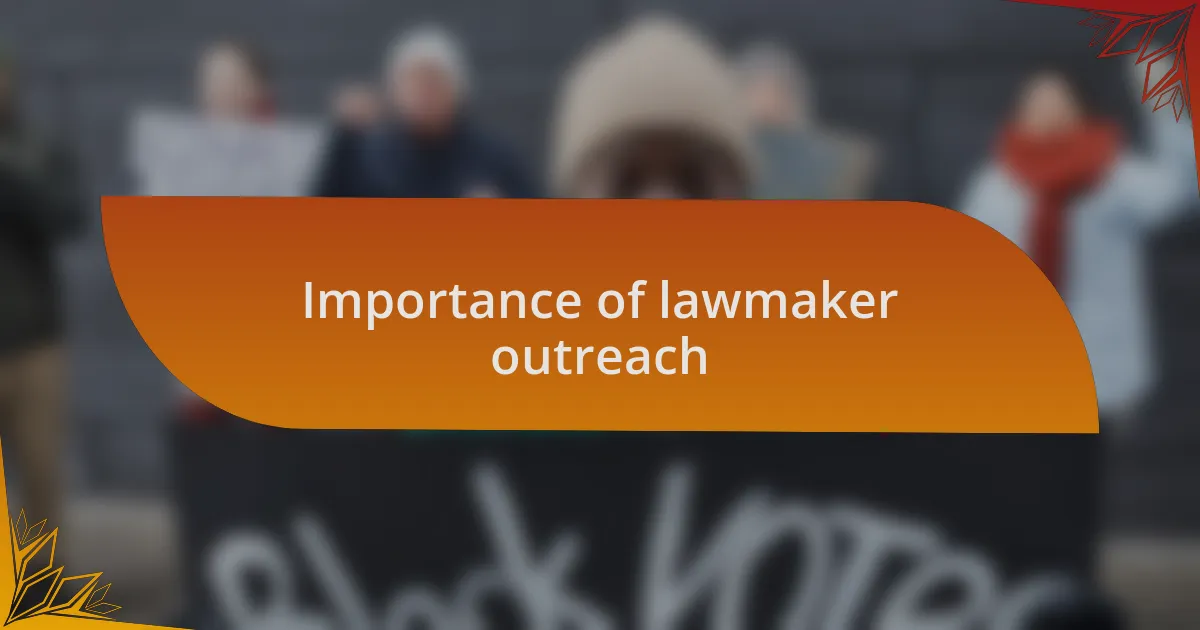
Importance of lawmaker outreach
Lawmaker outreach is a critical component in shaping reparations policy. From my experience, when constituents actively engage with their representatives, it amplifies the urgency of the issue. I recall a time when I wrote to my local senator about the need for reparations discussions in our community. The response I received not only acknowledged my concerns but also highlighted the human stories behind these policies. Isn’t it powerful to think that a single letter can spark a broader conversation?
Connecting with lawmakers also creates opportunities for education and awareness. I once attended a town hall where a community leader shared harrowing stories of families impacted by historical injustices. It struck me how lawmakers may not fully grasp the breadth of these experiences unless constituents bring them forward. Engaging directly helps bridge that gap, as lawmakers become not just decision-makers but advocates for their communities.
Moreover, effective outreach can lead to meaningful policy changes. I watched as a coalition of activists successfully lobbied for a reparations task force in our state. Their persistent outreach efforts emphasized that reparations are not just an abstract concept; they hold significant implications for future generations. What if everyone who cared about this issue took similar actions? The potential for change could be monumental.
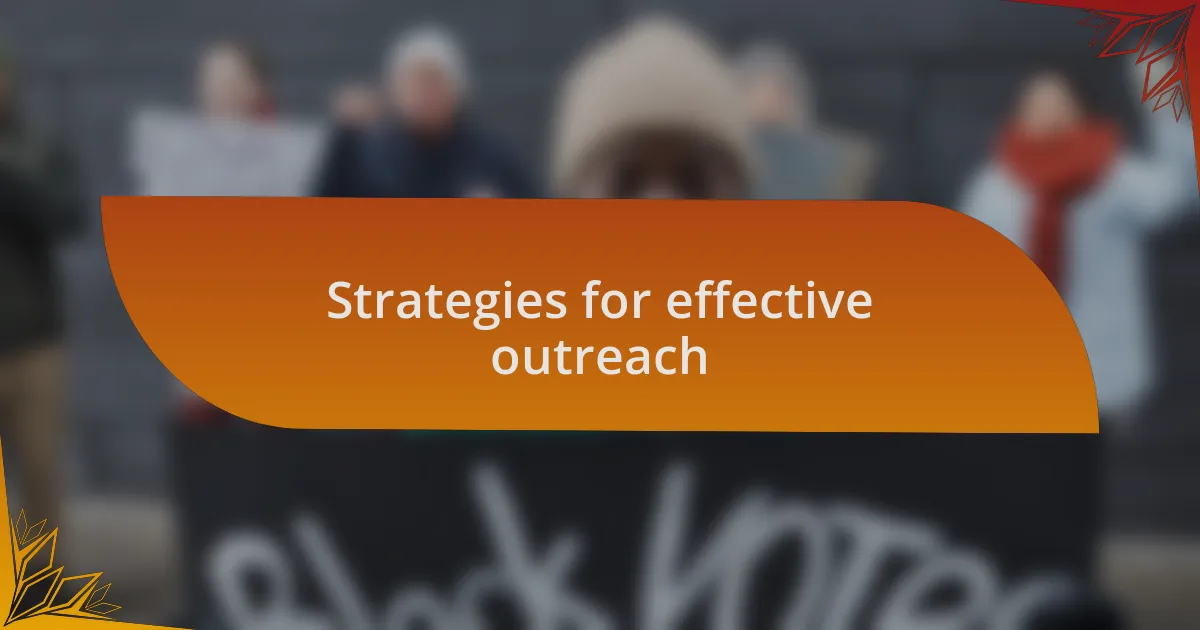
Strategies for effective outreach
When considering outreach strategies, personal storytelling emerges as a potent tool. I remember crafting a heartfelt email detailing my family’s history and the injustices faced over generations. This vulnerability allowed my lawmakers to connect with the issue on a personal level, often eliciting responses infused with empathy. Have you thought about how sharing personal narratives can make the abstract nature of policy resonate with those in power?
Additionally, organizing collaborative events can amplify your message. I participated in a community roundtable where diverse voices shared their experiences regarding reparations. This collective effort not only drew attention but also demonstrated to lawmakers the solidarity within our community. There’s something compelling about front-line voices coming together that can stir even the most indifferent representatives into action. Isn’t it fascinating how unity can transform individual concerns into a powerful movement?
Lastly, follow-up is key in outreach. During my advocacy, I made it a point to continually check in with my senator’s office after initial contact. Sending reminders or updates shows sustained interest, which can keep reparations at the forefront of their agenda. It’s easy for issues to be sidelined, but doesn’t consistent engagement signal to lawmakers that this is not just a passing trend, but a vital priority? Balancing persistence with respect can pave the way for lasting change.
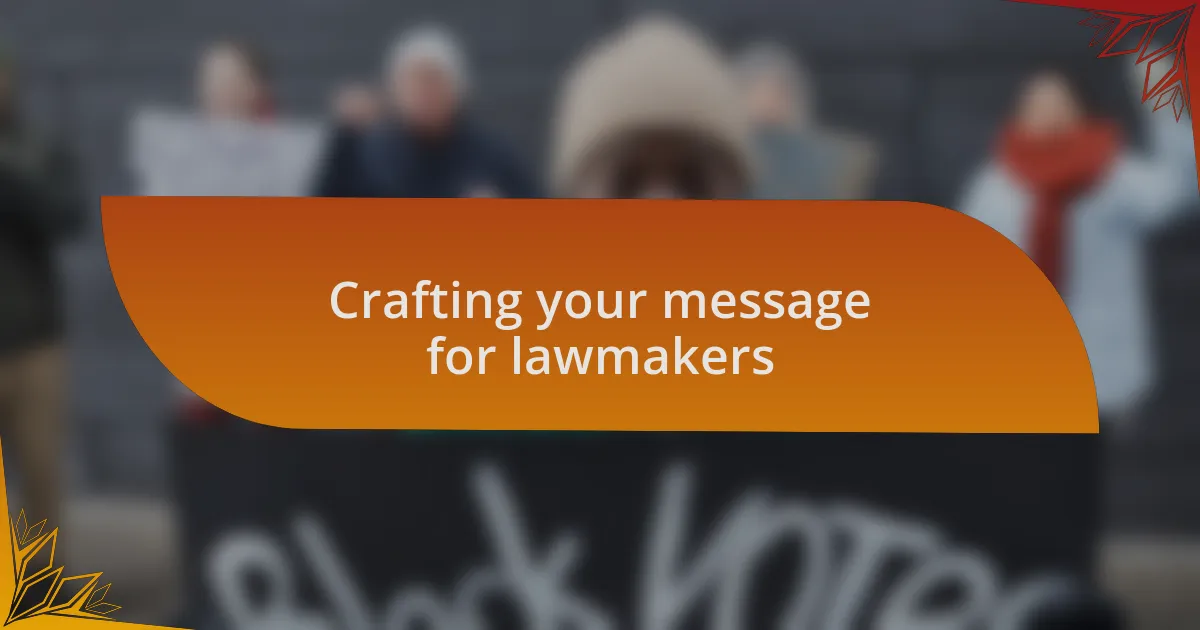
Crafting your message for lawmakers
When crafting your message for lawmakers, precision and clarity are essential. I recall drafting a one-page position statement that I prioritized over long paragraphs. By succinctly presenting the key demands for reparations and backing them with impactful statistics, I was able to maintain the attention of busy aides. Have you ever noticed how straightforward messages can cut through the noise?
Emotional authenticity is a must when addressing lawmakers. I shared a poignant story about my grandmother, who lived through systemic injustice, with the intent of humanizing the issue. This approach created a bridge between abstract policy discussions and real-life impact, prompting a response that felt more philosophical than political. Isn’t it interesting how exposing personal stakes can elicit deeper reflections from those in power?
Moreover, tailoring your message to the lawmaker’s existing beliefs can significantly enhance your outreach. In one instance, I researched my representative’s previous statements on social equity and aligned my message accordingly. By framing reparations as a holistic approach to creating lasting change, I demonstrated how supporting this cause could resonate with their values. Isn’t it powerful to think about how thoughtful alignment can turn skepticism into support?
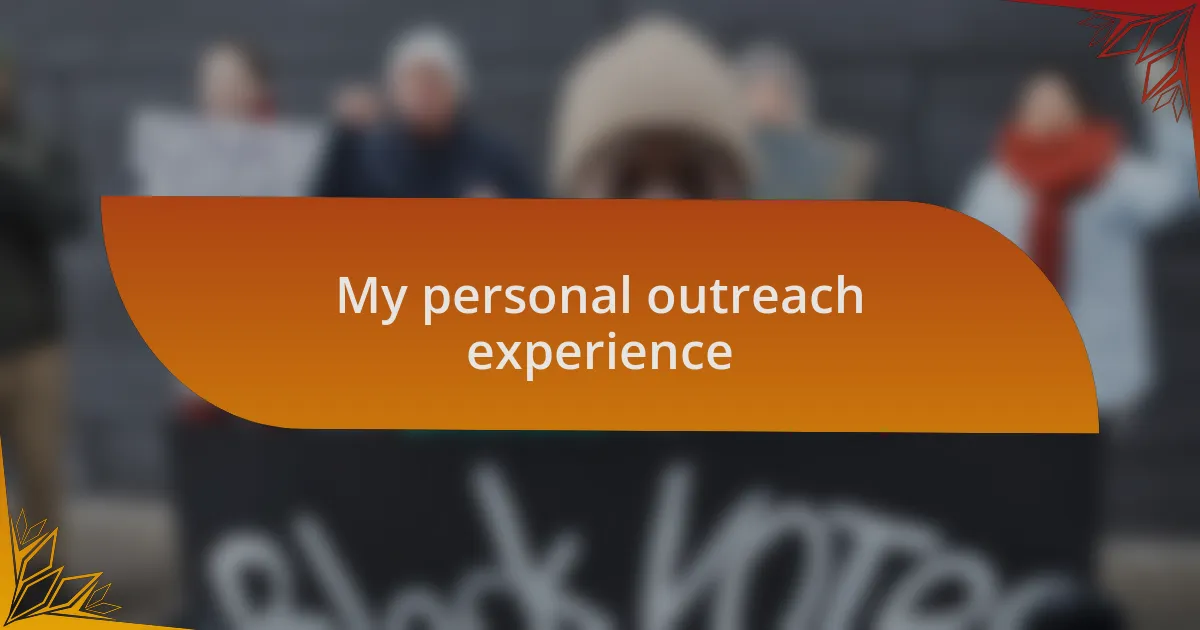
My personal outreach experience
I remember my first experience with directly reaching out to a lawmaker. It was a nerve-wracking moment, but I decided to share my journey in grassroots activism. I spoke not just about policies but about the people behind them, especially individuals who had been directly affected by historical injustices. This personal connection made my outreach feel more genuine, and I could sense it resonated with the staff member I was speaking to.
In another instance, I attended a community meeting where the lawmaker was present. I made it a point to connect on a personal level, asking questions about their own experiences and how they felt about the reparations discourse. It turned into a poignant conversation that revealed shared values and goals. Seeing them nod in understanding felt like a victory, reminding me that beyond politics, we all share the human experience of wanting to do right by one another.
What struck me most was the feedback I received after one particular outreach campaign. A lawmaker’s aide mentioned how my passionate delivery of personal stories made them reflect more deeply on the emotional weight of reparations. It validated my belief that reaching out with authenticity could change hearts as much as it does minds. Have you considered how your own story could ignite a similar spark in others?
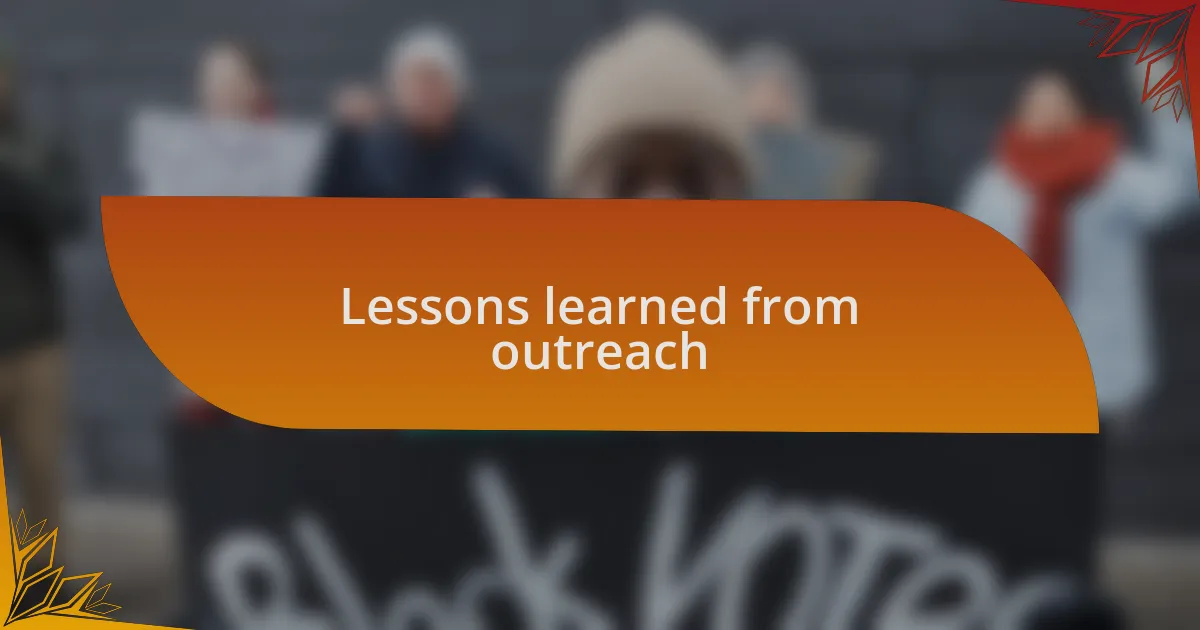
Lessons learned from outreach
One key lesson I learned from my outreach efforts is the undeniable power of storytelling. In one meeting, I shared an emotional account of a friend impacted by systemic inequalities. As I spoke, I could see the lawmaker’s demeanor shift; their interest piqued. I realized that weaving personal narratives into discussions about policy not only humanizes the issue but also fosters a deeper connection with those who have the power to create change.
I also discovered the importance of active listening during these interactions. At a town hall event, I posed a question about their stance on reparations and followed up with curiosity about the limitations they perceived. Their thoughtful response provided me with new perspectives, making me reevaluate my approach. This experience taught me that outreach is not just about conveying a message, but also about being receptive to the insights and reservations of lawmakers.
Lastly, the consistency of follow-up proved to be invaluable. After sharing my insights at a previous meeting, I sent a brief email expressing gratitude for their time and reiterating a key point from our discussion. The response I received hinted at a willingness to engage further on the topic. This reinforced my belief that maintaining a dialogue is crucial; it shows commitment and can lead to more meaningful conversations over time. How often do we overlook the potential of following up in our efforts? I now consider it a vital step in the outreach process.
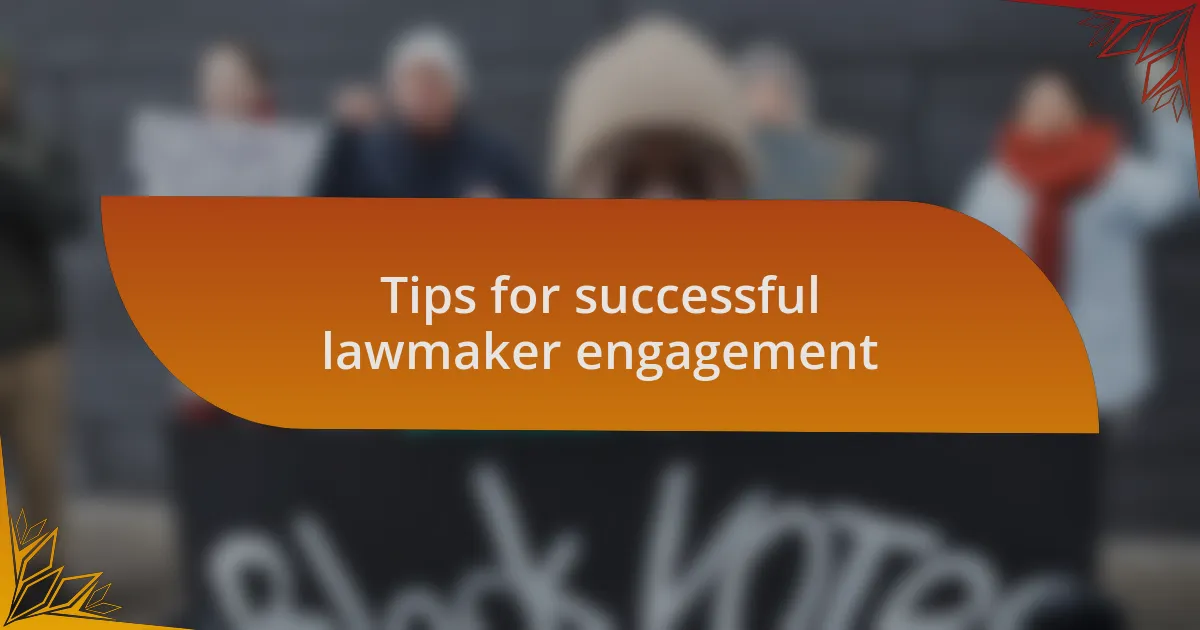
Tips for successful lawmaker engagement
Timing is everything when engaging with lawmakers. I remember a meeting where I had to make my case swiftly, just minutes before a vote. It was a whirlwind, but being prepared with concise, impactful points made all the difference. Don’t underestimate the power of brevity; lawmakers often have packed schedules and appreciate clear, focused communication that respects their time.
Building rapport is equally essential. I once reached out to a lawmaker before a public hearing, sharing a quick, personal story about why reparations matter to me. This simple connection created an open door, making them more receptive to my arguments during the hearing. It’s these personal touches that can make an impression—how often do you think about the human aspect behind policy discussions, rather than just the numbers?
Moreover, bringing data to the table can bolster your narrative. I vividly recall presenting compelling statistics about the historical impact of systemic inequalities during a legislative briefing. As I saw heads nodding in agreement, it reinforced my belief that combining emotion with facts creates a powerful synergy. Are you framing your arguments in ways that marry personal experience with robust evidence? This dual approach could be the key to unlocking deeper conversations with lawmakers.